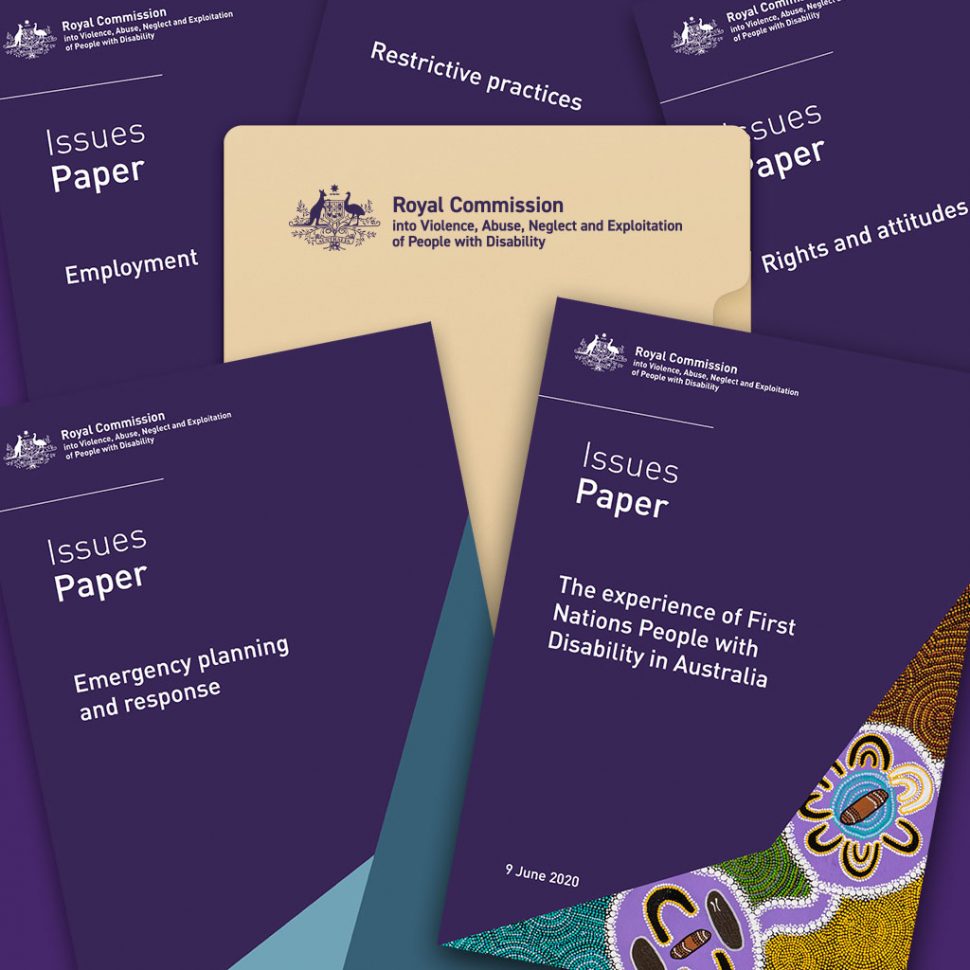What’s going on with the Disability Royal Commission during COVID-19?

Big issues
Over the last couple of months the Commission have released four issues papers:
🚨 Emergency planning and response
![]() First Nations people with disability
First Nations people with disability
Emergency planning and response
Disability Royal Commission issues paper: Emergency planning and response (open 15 April – 17 July)
The Commission wants to know what should be done to ensure people with disability are not at risk of violence, abuse, neglect and exploitation during emergencies.
They want to know how to make sure people with disability are not forgotten during emergencies – like the one we are currently in.
Rights and attitudes
Disability Royal Commission issues paper: Rights and attitudes (open 28 April – 31 July)
The Commission wants to hear about attitudes towards people with disability, and what can be done to change them.
Employment
Disability Royal Commission issues paper: Employment (open 12 May – 14 August)
The employment rate of people with disability in Australia is about half the rate of employment of people without a disability. And their median income is less than half of people without a disability.
The Commission wants to know why people are less likely to be employed and why they are paid less.
Restrictive Practices
Disability Royal Commission issues paper: Restrictive Practices (open 26 May – 28 August)
Restrictive practices are any actions that limit the rights or freedoms of a person with disability.
They can include things like physical restraint or use of medication.
But it can also include things like taking away the power from a power wheelchair, or taking away someone’s communication device.
The Commission wants to know about the impact of these practices and what can be done to prevent their use.
They also want to know about alternatives that keep people safe.
First Nations people with disability
The Commission wants hear what people think governments, institutions and communities can do to prevent violence, abuse, neglect and exploitation of First Nations peoples with disability in all systems and settings.
How to make a submission
The Commission isn’t holding public hearings at the moment, but you can still make a submission:
☎️ By phone
🖥 By video or audio
📝 In writing
🌐 Your submission can be in any language.
Call 1800 517 199
- Monday to Friday, 9am to 5pm AEST except public holidays.
Share your story using the Royal Commission website.
Private sessions are on hold right now – but you could start getting ready now by using the services below.
Legal support
If you would like to talk to someone before you make a submission there is help available. You can get free, independent specialist legal advice before talking to the Commission from the Your Story Disability Legal Support service.
☎️ Call the Your Story Disability Legal Support service on 1800 77 1800.
It is open Monday to Friday, 9am to 5pm AEST (except public holidays).
Some people might be asked to appear as a witness. If that happens there is financial assistance available.
Counselling
Reading, thinking, remembering and talking about violence, abuse, neglect or exploitation can be very upsetting.
The Royal Commission have set up a National Counselling and Referral Service through the Blue Knot Foundation. It is a free, trauma-informed specialist service for phone counselling support and referrals for people with disability, their families and carers.
☎️ You can call the National Counselling and Referral Service on 1800 421 468. It is open from:
- Monday to Friday, 9am to 6pm AEST
- Saturday and Sunday, 9am to 5pm AEST
You can also contact them via webchat, video call, or SMS, and you can access an interpreter.
More info about contact options are on the Blue Knot Foundation website.
Advocacy
Some disability advocacy organisations around the country have received funding specifically to help people with the Disability Royal Commission. They are independent and their help is free.
Find a Disability Royal Commission advocacy or support service near you.
Resources
There are plenty of resources to help you understand more about the Royal Commission. Most are on the Royal Commission website, but lots more are popping up all the time.
This list is a good place to start. We will keep updating it as we find more useful info.
Fact sheets from the Disability Royal Commission website document library
- Infographic: Making a submission
- Infographic: Sharing your story in a private session
- A5 Brochure: Sharing your experience with the Disability Royal Commission
- A5 Brochure: A guide to your private session with the Disability Royal Commission
- A5 Brochure: After your private session
- A5 brochure: Public hearings – A guide for witnesses at the Disability Royal Commission
Royal Commission Issues Papers include Easy Read and Auslan videos
Disability Royal Commission support services fact sheets and resources from the Department of Social Services (DSS).
- Disability Royal Commission Support Services fact sheet
- Disability Royal Commission Support Services fact sheet – Easy Read version
- Disability Royal Commission Support Services fact sheet – Translated versions
- Disability Royal Commission Support Services fact sheet – Auslan version
- Find Disability Royal Commission support services in your area
Resources from Your Story Disability Legal Support
- How to use Your Story Disability Legal Support (easy English version)
- Sharing Your Story with the Disability Royal Commission—Video
- Legal support to engage with the Royal Commission into Violence, Abuse, Neglect and Exploitation of People with Disability
- Can I name names?
- Can I share my story with the Disability Royal Commission?
- How am I protected if I receive a notice to produce?
- Protecting your story when you share it with the Disability Royal Commission
- Who can share a story with the Disability Royal Commission?
- Will I get into trouble for sharing my story with the Disability Royal Commission?
- What happens to my story after a private session?
- Ideas for preparing your submission

Join the conversation